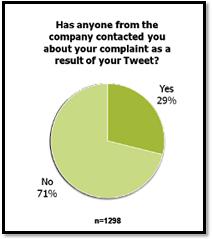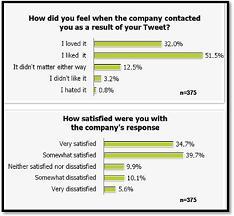In today’s post, Bill Jacobs addresses how brands are dealing with complaints, concerns, and questions at a time when consumers have an increasingly growing influence.
 A few years ago, we worked with a radio station that carried Howard Stern in mornings. Due to growing concerns among advertisers, the market manager convinced his bosses to cancel Stern, and replace him with a local show. As consultants, our advice to the client was to address listener complaints honestly, transparently, and directly. This was before there was Twitter, Facebook, and MySpace, but we expected (and actually received) a deluge of listener anger.
A few years ago, we worked with a radio station that carried Howard Stern in mornings. Due to growing concerns among advertisers, the market manager convinced his bosses to cancel Stern, and replace him with a local show. As consultants, our advice to the client was to address listener complaints honestly, transparently, and directly. This was before there was Twitter, Facebook, and MySpace, but we expected (and actually received) a deluge of listener anger.
But from the ivory tower at corporate came the edict that not a single phone call or email deserved any response. Not a word. Just silence. Crickets.
Suffice it to say, that station did not survive, and while its failure may have been due to a myriad of other issues, we believe that the company’s cavalier attitude in shutting out its customers played a role in its demise.
Fast-forward to 2011, and perhaps your station has set up a Twitter account to better engage your listeners with your brand – that’s a great first move. But what do you do with questions or even worse, complaints? While radio stations aren’t going to receive the same level of inquiries as a retail business, there are enough listeners out there to complain about not getting their tickets, links not working on the site, getting shut out of a free concert, the music on the station, or something the morning show said or did.
We live in an Era of Bitching. Everyone’s empowered and social media is at the core of the consumer’s new influence, fueled by the ability to marshal forces online and make a lot of digital noise. That’s what’s been going on in recent weeks with Netflix, BlackBerry, and even clunkiness issues with Apple’s iOS 5 upgrades.
 So what’s your strategy to deal with these kinds of complaints? If you even have one, you’re in the minority according to a new study by Maritz Research and evolve24. More than seven of ten “complainers” say they received no contact from the company they contacted to complain about something. Talk about blowing it, these are huge missed opportunities to directly address and engage people who have issues, questions or complaints.
So what’s your strategy to deal with these kinds of complaints? If you even have one, you’re in the minority according to a new study by Maritz Research and evolve24. More than seven of ten “complainers” say they received no contact from the company they contacted to complain about something. Talk about blowing it, these are huge missed opportunities to directly address and engage people who have issues, questions or complaints.
Additionally, you’re missing the opportunity to show others in your social network not only that you care about what they think, but that you’re willing to address it head on in a public forum.
It turns out that it’s an even bigger opportunity because those using Twitter don’t have a particularly high expectation of even getting a response:
- Half (49%) of those surveyed said they expected a response from the company that they complained to.
- These expectations are even lower among younger people – only four of ten 18-24s expect a response compared to about two-thirds of those over the age of 55.
- Among those who actually received a response, how did they feel about it? The good news is that responsiveness matters, as 85% either “liked” or “loved it” and three-fourths were either “somewhat” or “very satisfied” as a result.
- And for those who simply hear crickets, 87% said they would have either “liked” or “loved” to have heard from the company – again, a missed opportunity.
 The lesson here is to not fear complaints, but instead, address them and do so in a timely manner. In most cases, your response will be greeted positively both by the “offended party” and everyone else who is following you.
The lesson here is to not fear complaints, but instead, address them and do so in a timely manner. In most cases, your response will be greeted positively both by the “offended party” and everyone else who is following you.
Taking a “Sounds Of Silence” approach to social media and not responding (or not doing so quickly) will only degrade your relationship with your fans. Instead, focus on a “Takin’ Care Of Business” approach and deal with issues, questions and, yes, even complaints head on and in a timely manner.
Just ask BlackBerry.
- A 2020 Lesson?It Could All Be Gone In A Flash - April 24, 2025
- How AI Can Give Radio Personalities More…PERSONALITY - April 23, 2025
- Can Radio Afford To Miss The Short Videos Boat? - April 22, 2025




I had a negative CX with our local Home Depot and one of its recommended vendors. After becoming frustrated with their intransigence, I decided to get their attention via the social media route and was quite surprised. I wrote about my experience here https://bit.ly/v0sPol
Yup, in the Era of Bitching, the consumer truly has a great conduit for getting it done. And maybe the bigger company, the better. Thanks, Buzz.